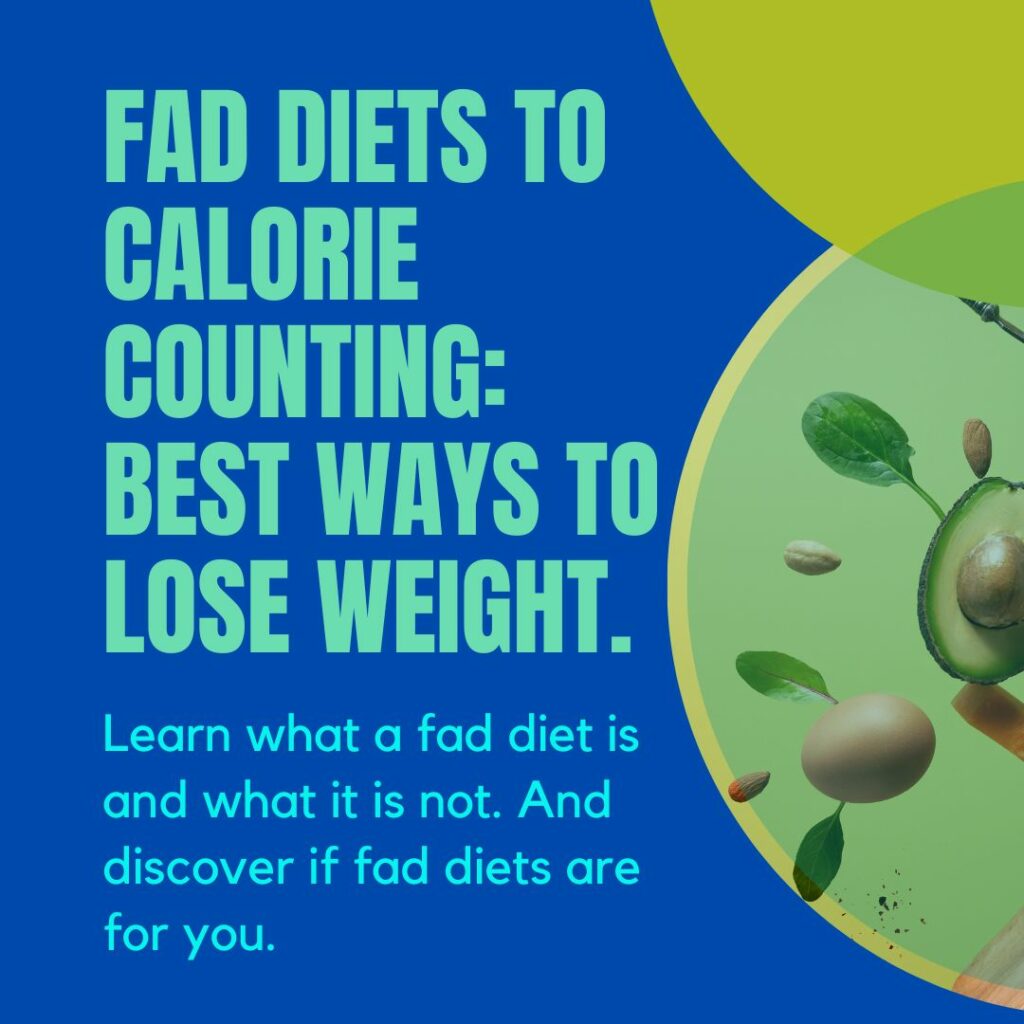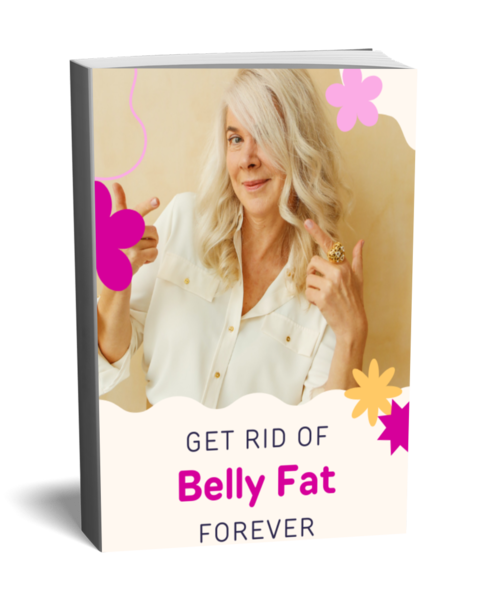Fad Diets to Calorie Counting: Best ways to lose weight.

Disclosure: You should be aware that some of the links in this article may be affiliate links, which means that if you decide to buy something through one of these links, I may receive a commission, which does not increase the cost to you. This site does not provide financial or medical advice and is just for entertainment purposes. In our privacy policy, you may see our affiliate disclosure.
There are a variety of diet plans that people use in an attempt to lose weight. Some diet plans, such as fad diets, are not based on sound scientific evidence and may actually be harmful. Other diet plans, like counting calories, are based on good science and can help you lose weight.
It is a good idea to aim to lose between 0.5 and 1 kilogram (1.1 to 2.2 pounds) per week during the course of your weight loss journey. In order to lose one to two pounds per week, you need to burn between 500 and 1,000 more calories each day than you take in. This can be done by eating a low-calorie diet and working out regularly.
The difference between a fad diet and a healthy diet
When it comes to dieting, there are two main types of diets: fad diets and healthy diets. So, what’s the difference?
Fad diets are usually based on the latest trend or fad. They’re often very restrictive, cutting out entire food groups or limiting calories to an extreme degree. And, they’re not sustainable in the long term. People who follow fad diets often find themselves yo-yo dieting, bouncing from one diet to the next.
Healthy diets, on the other hand, are based on eating nutritious foods that promote a healthy weight. They’re not about deprivation or cutting out entire food groups. Instead, healthy eating is all about moderation and making smart choices. Plus, a healthy diet is something you can stick to for life.

FREE
Weight Loss eBook
Discover How To Get Rid of Stubborn Belly Fat the Easy Way and Forever.
A truly healthy diet.
A diet is considered to be truly healthy if it gives the body all of the nutrients that it needs in order to perform its functions correctly. This comprises a selection of fruits, vegetables, lean proteins, and grains and cereals that are whole.
It’s also important to limit how much processed food, sugary drinks, and unhealthy fats you eat. Diabetes, heart disease, and stroke are all long-term diseases that are more likely to happen if you eat a lot of saturated fat and not enough vegetables and fruits.
Table of Contents
What is calorie counting?
When it comes to weight loss, calorie counting is one of the most popular methods. But what is calorie counting? And does it really work?
Calorie counting is a method of tracking the number of calories you consume in a day. The idea is that by knowing how many calories you’re consuming, you can better control your weight.
There are a number of different ways to count calories. One popular method is to use a food journal or app to track the calories in each meal. Another method is to estimate the calorie content of meals based on their ingredients.
So, does calorie counting work? Some studies have shown that it can be an effective way to lose weight. However, other research suggests that it’s not necessarily the best method for long-term weight loss.
What is the fastest way to lose weight with calorie counting?
Losing weight can be difficult and time-consuming, but there are certain methods that can help speed up the process. One popular method is calorie counting, which involves tracking the number of calories you consume in a day and making sure to stay under a certain limit.
There are a few different ways to go about calorie counting. You can either use an online calculator or app, or you can keep track of your own intake manually. If you’re going to be doing it yourself, it’s important to be as accurate as possible in order to see results.
The best way to lose weight quickly with calorie counting is to pair it with other healthy lifestyle changes, such as exercising more and eating less processed foods. Making these changes can help you see results more quickly and reach your goal weight in no time.
Is calorie counting an effective way to lose weight?
Many people believe that calorie counting is an effective way to lose weight. And while it is true that this method can help some people slim down, there are also a number of drawbacks that make it less than ideal for many dieters.
For starters, calorie counting can be very time-consuming and tedious. Not only do you have to be constantly aware of the food you’re eating and its calorie content, but you also have to be diligent about tracking everything you eat throughout the day. This can quickly become overwhelming, especially if you’re trying to maintain a busy lifestyle.
Also, calories alone aren’t always a good way to tell if you’re eating healthy or not. Just because a food is low in calories doesn’t necessarily mean it’s good for you. In fact, many so-called “diet” foods are actually quite unhealthy.
Is calorie counting enough by itself?
In a world where we are constantly bombarded with fad diets and the latest weight-loss trends, it’s easy to get caught up in the idea that we need to be doing more than just counting calories to lose weight. However, the truth is that calorie counting is the most important factor in any weight-loss plan.
Yes, there are other things to consider, such as the type of foods you’re eating and your activity level, but if you want to lose weight, you need to create a calorie deficit. That means eating fewer calories than your body needs.
There are a lot of ways to do this, but the most effective way is to track your food intake and make sure you’re eating less than you’re burning.
Finally, relying on calorie counting as your sole method of weight loss can lead to unhealthy habits such as obsessive food tracking and restriction. If you’re thinking about starting a calorie-counting diet, it’s important to be aware of both the potential benefits and drawbacks before making any decisions.
How many calories do you burn in a day without exercise?
A lot of people don’t realize how many calories they burn every day simply by going about their daily activities.
Your BMR, or basal metabolic rate, is the minimum amount of energy your body needs to stay alive and functioning. Depending on your age, gender, weight, and height, this accounts for 60-70% of your daily calorie burn.
Your basal metabolic rate is the number of calories your body burns each day when you do nothing. This is the average amount of calories needed by the human body to function normally. Simply consuming fewer calories than you expend will not result in weight loss. Your BMR is affected by age, body fat percentage, and muscular mass, among other things.
In order to determine your BMR, plug your stats into the following formula: BMR = 10 x weight (kg) + 6.25 x height (cm) – 5 x age (years) + 5. Take the number and deduct 161 if you’re a female. Active people should add 12% to their basal metabolic rate. Multiply that number by 1.1-1.6 if you have a sedentary lifestyle.
The rest of the calories you burn come from being physically active, like when you work out or just go about your day. Even if you don’t do much all day, you still burn quite a few calories.
FREE BMR Calculator
Click Here
Does walking really burn calories?
Yes, walking does burn calories. In fact, it is an excellent way to burn calories and lose weight. Walking can burn up to 500 calories per hour, depending on the intensity. And, it is a low-impact exercise that is easy on the joints. So, if you are looking to lose weight, or just stay in shape, walking is a great option.
Benefits of walking.
Walking is a low-impact form of exercise that is easy to get to and is good for our physical and mental health in many ways. Just 30 minutes of walking each day can improve our cardiovascular fitness, strengthen our bones and muscles, and improve our balance and coordination.
In addition to helping our bodies, walking can improve our mood and make us feel less stressed. Walking outside in nature has been shown to raise vitamin D levels and make people feel less anxious and sad. So, even a short walk in your local park could be beneficial for your mental well-being.
How many calories do you burn walking 10,000 steps?
According to researchers at the Harvard School of Public Health, walking 10,000 steps each day can help you burn a significant number of calories and significantly improve your health.
The research team found that people who walk 10,000 steps each day tend to have lower BMIs and smaller waists than those who don’t. They also have lower levels of LDL (bad) cholesterol and higher levels of HDL (good) cholesterol.
So how many calories does walking 10,000 steps actually burn? The answer may surprise you – it’s estimated that you can burn anywhere from 400 to 750 calories by walking 10,000 steps. That’s a lot of calories!
So if you’re looking to improve your health and lose weight, start by adding some extra steps into your daily routine. You may be surprised at how quickly you start seeing results.
The best way to reduce calories.
There are many ways to reduce the number of calories you consume each day. Some people may choose to eat smaller portions, while others may opt for healthier alternatives to their favorite foods. Here are a few tips to help you cut back on calories and improve your overall health.
- Drink plenty of water. This will help you feel fuller and more satisfied after meals, preventing you from overeating.
- Make sure to include plenty of fruits and vegetables in your diet. These foods are packed with nutrients and fiber, which can help keep you feeling full throughout the day.
- Avoid sugary drinks and snacks. These items are often high in calories and low in nutritional value. Choose water or unsweetened beverages instead.
- Reduce your consumption of saturated fats and refined carbohydrates. These foods can contribute to weight gain and increased cholesterol levels.
Is reducing calories dangerous?
The number of calories we eat every day is one of the most important things we can do to stay at a healthy weight. But is it possible to consume too few calories?
Recent studies have suggested that reducing calorie intake by 30% could lead to a longer life. However, other experts are concerned that this could have dangerous consequences.
Reducing calorie intake can lead to weight loss, but it can also cause muscle loss and weakness. It can also cause fatigue, irritability, and difficulty concentrating. In extreme cases, it can even lead to death.
So while reducing calorie intake may have some benefits, it’s important to do so safely and under the supervision of a doctor or dietitian.
What is considered a fad diet?
The term “fad diet” refers to various eating strategies that are promoted as the best and quickest way to shed excess weight.
On the other hand, some of these diets call for you to give up eating particular kinds of food because those foods lack the necessary nutrients that your body needs to function properly and stay healthy.
Any diet plan that advertises rapid weight loss or other health benefits is considered to be a fad diet. It is typically a short-term diet that is only meant to be followed for a certain amount of time.
The foods and beverages that can and cannot be consumed on a fad diet are typically very narrowly defined, and the elimination of entire food groups is frequently a requirement.
The majority of food trends are not supported by reliable scientific evidence and, in the long term, may be detrimental to a person’s health.
It’s possible that following a fad diet could help you lose weight quickly in the short term, but the weight you lose will most likely be water weight and not fat.
This indicates that as soon as you resume your regular eating habits, you will put on weight just as quickly as you lost it.
If you are considering participating in a trendy eating plan but want to make sure it is safe for you to do so, you should first consult with your primary care physician.
Are fad diets good or bad?
We have all had that experience. You start to notice that you are carrying a little extra weight, so you decide that it is time to start a diet. However, which one? There are a lot of them available, and they all assert that they are the greatest one. So, you go on a fad diet. But do you think it’s money well spent?
In most cases, as already mentioned, participants of fad diets are required to give up entire food groups or limit their diet to particular foods. This can result in deficits of essential nutrients, in addition to other health issues. In addition to this, they cannot be maintained in the long run. A trendy diet might help you lose weight in the short term, but you’ll probably put it all back on once you stop following the plan.
The best advice given by weight loss experts is to stick to a balanced eating plan and get enough of exercise if you want to drop excess pounds and keep them off.
How can you tell if a diet is a fad?
A diet is considered a fad if it promises fast weight loss or other health benefits without asking people to make major changes to their lifestyles that will last for a long time. In most cases, the evidence does not support the claims made by fad diets, which typically center on a single food or nutrient as their foundation.
Here are four indicators that a diet might just be a passing trend:
- It focuses on a specific type of food or nutrient as its foundation.
- It removes entire food groups from the diet.
- It promises fast results without asking people to make big changes to how they live.
- It is not supported by scientific evidence.
Do fad diets work?
A weight loss plan is considered a fad diet if it promises rapid weight loss with little to no commitment over the long term. But do these diets really produce results?
The correct response is both yes and no. When you first begin a fad diet, you might experience some initial weight loss, but this is typically due to a loss of water weight or muscle rather than a loss of fat. And if you abandon the diet, the weight will most certainly return to its previous level.
The fact that trendy diets are often very limited also makes it hard to stick with them for a long time. Also, they can be dangerous to your health if they tell you to eat too much at one meal or to stop eating a whole group of foods.
If you are looking for a healthy way to lose weight, it is important to stay away from fad diets. This is because these diets are not nutritionally sound. Instead, you should focus on making changes to your food and activity habits that can be maintained over an extended period of time.
The Atkins Diet:
The goal of this diet is to help you lose weight by cutting back on how much insulin your body makes. Insulin helps your body store fat and carbohydrates.
2.The Clay Diet:
On the Clay Diet, you mix clay that you may eat, like Bentonite, with water and drink the mixture. It is not intended to take the place of food, but rather to complement the diet you are already following. It is believed that c lay has the ability to eliminate toxins, pollutants, and poisons from the body by absorbing them and then expelling them.
Clay, when consumed by mouth over an extended period of time, may be harmful to your health. If you eat clay for a long time, it can cause your potassium and iron levels to drop. In addition to that, it could result in lead poisoning, muscle weakness, intestinal blockage, skin rashes, or respiratory difficulties, to name a few health risks.
3. The Cookie Diet:
The Cookie Diet is a simple and easy-to-carry snack option that eliminates the need for any kind of preparation. Just bring along a bag of cookies to snack on during the day. After you reach your goal weight, keep eating healthy food and enjoy the cookies as a low-calorie snack in between meals.
Dr. Siegal came up with the 10X Cookie Diet, which says you should eat one or two “hunger-controlling” cookies every two hours, for a total of nine cookies per day. There are many different varieties available, such as chocolate brownie granola, cinnamon oatmeal, and maple granola. You can also eat one “real” meal a day.
Dieters who oppose cookie diets maintain their skepticism. They say that eating less than 1,000 calories a day is not an effective way to lose weight and can lead to a lack of potassium, gallstones, heart palpitations, less kidney function, and feeling dizzy.
The Sleeping Beauty Diet:
The Sleeping Beauty diet advocates the use of sleeping medications with the goal of remaining asleep during normal waking hours in order to avoid the need to consume food.
This trend, which is also known as “narcorexia,” is not only ineffectual but also dangerous. It is also a form of eating disorder.
In all honesty, there is no scientific data to back up the claims made by The Sleeping Beauty Diet. It’s exactly the same as going on a low-calorie diet, which already slows down the metabolism. The body will have a greater craving for food, and it is highly likely that this will culminate in episodes of binge eating during awake hours.
Why do people gain weight after being on a fad diet?
The majority of people who try different fad diets end up gaining back the weight they lost. This is why:
When you stop eating certain foods or groups of foods, you may feel irritable and tired. This can cause you to overeat or binge when you give in and allow yourself to consume the “prohibited” foods in the end.
Your metabolism may also slow down if you follow a fad diet. If you reduce the number of calories you consume too much or eat too few carbohydrates, your body will enter a state of hunger and begin to hoard its fat reserves.
Changing one’s food and way of life in a way that can be maintained over time is the most effective strategy for long-term weight loss. Consume mostly nutritious, unprocessed foods, and keep your body active on a daily basis.
The quickest and safest way to lose weight.
It may sound like an impossible task to lose weight rapidly while avoiding health risks, but it doesn’t have to be that way! You can easily and quickly lose those extra pounds by following a few simple rules.
Finding a plan that works for you is the first step toward losing weight in a healthy way. There is a wide selection of diets and exercise plans available. So, it’s important to choose one that fits your goals and way of life.
When you’ve identified the strategy that works best for you, don’t deviate from it! It’s possible that this will require some adjustments to both your diet and your workout routine, but in the end, it will be worth it.
Keeping yourself motivated throughout the weight loss process is another important factor. When you aren’t getting results as quickly as you’d want, it’s natural to become discouraged, but you shouldn’t give up on what you’re doing! Always keep in mind the reason you’re doing this, and keep pushing yourself until you reach the weight you want to be.
Summary
When it comes to losing weight, there are a lot of different methods out there.
There are so many different ways to lose weight these days, from fad diets to counting calories, that it can be difficult to determine which one is best for you.
But there’s no need to panic because we’re here to assist you! No matter what your objectives are, the following are the most effective strategies for weight loss.
If you are seeking a method that can help you lose weight quickly, then you should consider trying a fad diet. Most of the time, to follow one of these diets, you have to cut out whole food groups or eat an unusual mix of foods.
Although they might be effective in the short term, they are not sustainable, and it is highly likely that you will gain back any weight that you lose as soon as you return to your regular eating routine.
Counting calories is a healthier and more long-term approach to weight loss, but it can be difficult to get started.

FREE
Weight Loss eBook
Discover How To Get Rid of Stubborn Belly Fat the Easy Way and Forever.
Disclosure: You should be aware that some of the links in this article may be affiliate links, which means that if you decide to buy something through one of these links, I may receive a commission, which does not increase the cost to you. This site does not provide financial or medical advice and is just for entertainment purposes. In our privacy policy, you may see our affiliate disclosure..










